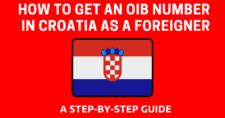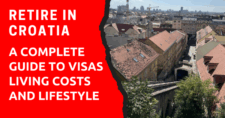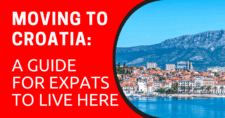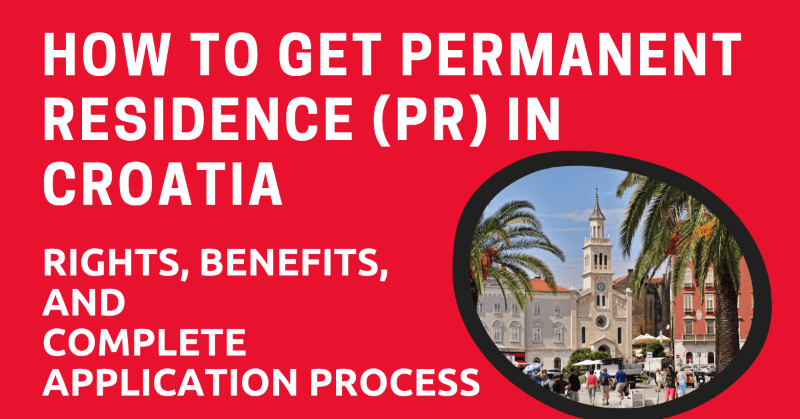
This article will take approximately 21 minutes to read. Don't have the time right now? No worries. Email the ad-free version of the article to yourself and read it later!
Learn every step to apply for Permanent Residence (PR) in Croatia, from conditions, documents, language tests, to the rights and benefits you’ll receive once you gain PR status.
If the OIB is “the key” that opens the door for you to start a life in Croatia, obtaining PR (Permanent Residence) is like “a golden key” that allows you to live freely almost on par with actual Croatian citizens.
Like my friend who is just reaching 5 years in Croatia, they’re both anxious and excited because applying for PR doesn’t just mean “you can stay longer,” it’s a real life-changer for expats in this country. From being a visitor, you become a “permanent resident” with rights to welfare, work, and a secure life.
I wrote this article as thoroughly as possible to help everyone planning to stay in Croatia long-term, whether you’re a worker, student, investor, or even a digital nomad who loves this city.
Disclaimer: This article may include links to products or services offered by ExpatDen's partners, which give us commissions when you click on them. Although this may influence how they appear in the text, we only recommend solutions that we would use in your situation. Read more in our Advertising Disclosure.
Contents
- Key Takeaways
- Benefits for PR holders in Croatia
- Comparing Temporary Residence vs. Permanent Residence in Croatia: What's the Difference?
- Conditions for PR application in Croatia
- Document checklist for Croatian PR application
- Steps to apply for PR in Croatia
- Approval Time for Croatian PR
- Fees
- Common Mistakes in Applying for Croatian PR
- Preparing for the Croatian language Test
- Renewing Croatian PR
- Getting the Croatian Citizenship
Key Takeaways
- PR (Permanent Residence) grants the right to live, work, and access state welfare almost equivalent to Croatian citizens, providing a more stable life than temporary residence status.
- Applicants must have legally resided in Croatia continuously for 5 years with a requirement not to leave the country for more than 6 consecutive months or a total of more than 10 months.
- PR holders have access to the health insurance system (HZZO), education, social security, can purchase property, and can travel/work in EU member countries as specified.
- Applicants must pass the Croatian language and culture knowledge test at the B1 level, which requires serious and extensive preparation as it’s a challenging part of the application.
- Having PR status is an important first step before one can apply for Croatian citizenship, requiring at least 8 years of legal residence (including at least 3 years of PR).
Benefits for PR holders in Croatia
Many might wonder, “How is having PR better than temporary residence?” The answer is “more than you think” because Permanent Resident status in Croatia grants almost all rights that citizens have, except the right to vote and hold a passport.
The benefits after obtaining PR are quite comprehensive, including access to social welfare systems, health insurance, and tax rights, as well as the ability to participate in various educational and vocational training programs. Some people can also apply for scholarships, although government scholarships may have some exceptions, making it an excellent option for those wanting to stay in Croatia long-term
No More Permit Renewal
Having PR in Croatia is considered a significant turning point in life because it means having the right to live and work indefinitely. Previously, one had to renew their permit every 3 – 6 months or sometimes visit the police station every month to update their temporary status. At that time, it felt like everything was still unstable, constantly preparing documents, checking expiration dates, and hoping each time it would go through.
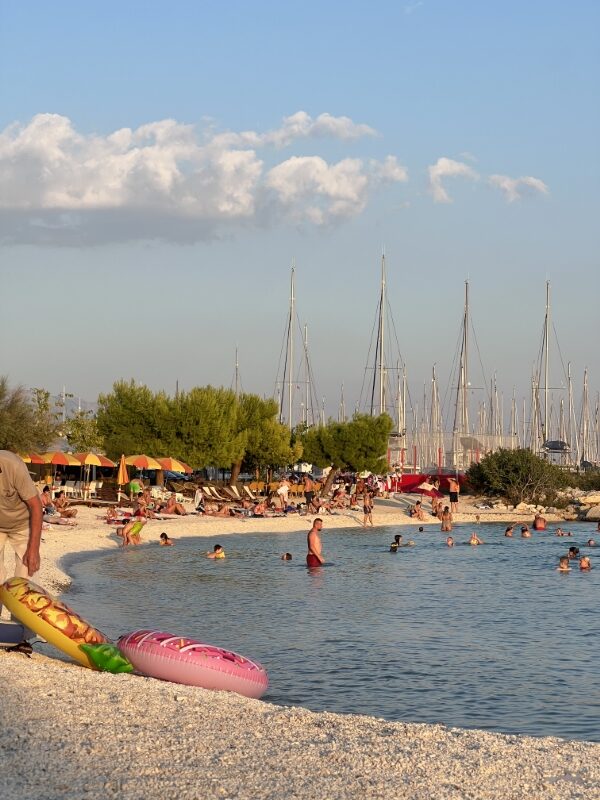
But if you have PR, you’ll feel much more at ease. You can live, work, or change jobs without needing additional permission. You can move cities, start your own business, or plan for the long-term without any hitches. It’s like having the true right to live in Croatia without having to chase deadlines anymore.
Travel within the EU
Another appealing benefit of having PR in Croatia is the ability to travel, work, and live freely in other EU member countries within a set period. It means if you plan to expand your career path, study in Europe, or travel frequently, having PR will make everything much easier.
Healthcare, Education, and Economy
In terms of social and economic benefits, PR holders have access to Croatia’s healthcare insurance system (HZZO), which is a high-quality public health system at government-subsidized rates. They also enjoy educational rights from basic to university levels at the same rates as Croatian citizens, which is great for those who plan to retire here.
Economically, you can own property too. Whether it’s a house or land This helps reduce investment barriers and truly opens up real estate market opportunities. Additionally, PR holders can participate in the country’s social security system, which includes pension benefits, family support, and unemployment rights when necessary.
Other Rights
Moreover, we have the right to join associations or professional organizations, and can access the local goods and services market just like the locals. One goal that many aspire to is that holding PR long enough becomes an “important gateway” to applying for Croatian Citizenship, which means full rights as a true citizen here and many other rights such as
- Living and working permanently in Croatia without needing a work permit anymore
- Travel freely in and out of the country without losing residency status
- Access social welfare benefits, child subsidies, tax reductions, and state health insurance
- Have the right to attend vocational training, further studies, or apply for certain scholarships
- Legally join organizations or trade unions
- Access the goods and services market equivalent to a citizen
Most importantly, PR is the first step toward obtaining Croatian citizenship. Once you have held PR for the legally required time period, you can apply for citizenship through the Naturalization process, which will open the door to full Croatian citizenship rights, including voting rights and the special privileges of being an EU citizen.
Comparing Temporary Residence vs. Permanent Residence in Croatia: What’s the Difference?
When I was living in Croatia for about a year, I was in the Temporary Residence stage, which requires renewal every 3 to 12 months depending on the permit. It involves quite detailed paperwork, from proof of address, rental contracts, health insurance, to financial proof. Each time you need to renew the permit, you must prepare a complete set of documents just like when applying for a new one. That’s why I understand why many people planning to stay long-term aim for Permanent Residence (PR).
From listening to the experiences of friends who have been here for a long time, having PR status means you can live and work without time limits, unlike when you were Temporary, where you had to keep track of your stay days and couldn’t leave the country for more than 6 consecutive months or you’d become ineligible for visa renewal. However, for those with PR, you can leave the country for up to 1 year without needing to renew your permit annually.
While I was in Croatia for a year, I began to notice clear differences. For instance, those with PR can buy a house or land more easily without the legal restrictions that temporary residents face. You can also work or start a business without needing a separate Work Permit. Importantly, you have full access to social benefits, including the healthcare system, social security, and the right to apply for Croatian citizenship in the future.
Conditions for PR application in Croatia
Even though I was only in Croatia for a year and haven’t applied for PR, from what I’ve studied, applying for Long-Term Residence and Permanent Stay for third-country nationals has clear rules. For applying for Long-Term Residence, the requirements are as follows:
- Applicants must have had temporary residency status or refugee status in Croatia for 5 consecutive years.
- Applicants must not be absent for more than a total of 10 months, or a single absence exceeding 6 months.
- There are some exceptions, such as for education or certain types of work, where time is counted as half.
- Applicants must have valid travel documents.
- Applicants must have sufficient funds for living expenses.
- Applicants must have health insurance from the state (HZZO) or international health insurance.
- Applicants must have basic knowledge of the Croatian language and Latin script at level B1, except preschool children, graduates in Croatia, and those aged 65+.
- Applicants must not pose a threat to public order, security, or health.
For the Croatian language and culture exam, many may need to take it to prove B1 level knowledge. The exam covers listening, speaking, reading, writing skills, and Croatian culture, administered by humanities and social sciences faculties at various universities across Croatia.
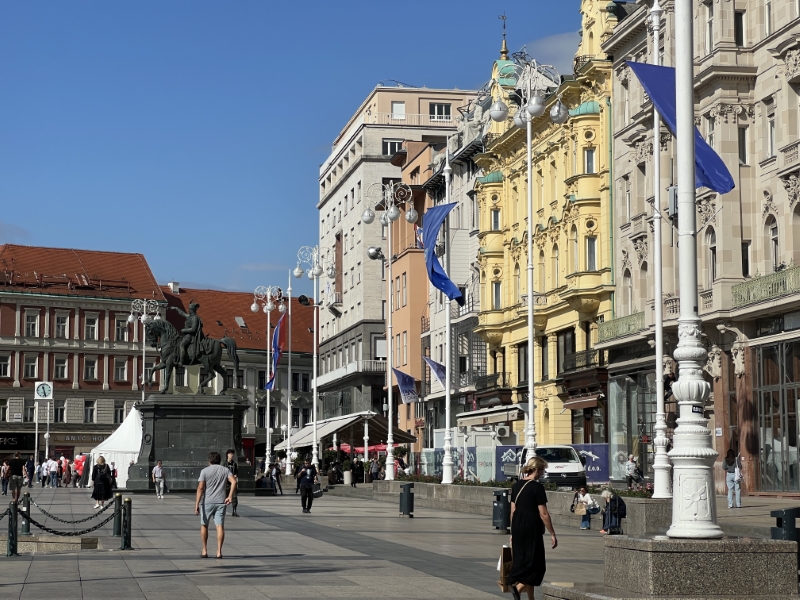
Permanent residence will be granted to those with ties to Croatian citizens, such as spouses or family members, or to members of the Croat ethnicity who live abroad and return to Croatia for permanent residence, including children born and residing in Croatia but have yet to apply for residency status.
For both types, applicants must submit their application at the police station in their temporary residence area, and the decision will be made by the Ministry of the Interior. There is a processing fee and a fee for issuing the biometric residence permit, which can be paid via online banking. You can find payment details at MUP
Document checklist for Croatian PR application
Some of the documents required are similar to those for a Temporary Residence application. I recommend that if you’re planning to apply for PR, make copies of documents from the start and keep the receipts for each visa extension, including the expired Residence Card because they help verify your residence history and can make the PR application process smoother.
The main documents required for a PR application for third-country nationals (outside the EU) include
- a valid passport
- passport-sized photos
- a copy of the temporary residence status document
- Criminal record certificate from your home country and any country you have resided in for over 1 year
- Proof of financial status (bank deposits, pay slips)
- Proof of residence registered legally
- Health insurance proof (HZZO or private)
- Certificate of Croatian language proficiency and Latin script (B1 level)
- Proof of marriage to a Croatian citizen or having a child who is a Croatian citizen (if applicable)
- For refugees or those under protection, a certificate of refugee status/subsidiary protection (if applicable)
- Application form (Form 1a)
- Fees
Steps to apply for PR in Croatia
Once all documents are prepared, the next step to apply for Permanent Residence (PR) in Croatia is to fill out the form Form 1a and submit it to the local police station at the temporary address, along with payment of the fee, which can be paid through a bank or internet banking After that, the officers will check the documents and may schedule an interview to confirm your eligibility
Once submitted, you have to wait for the Ministry of the Interior (MUP) to review. If approved, you will receive full Permanent Residence rights and need to complete biometric procedures, fingerprinting, document signing, and receive your Residence Card valid for 10 years
Interview
From asking friends who have interviewed for PR in Croatia, they said it was quite a scary and exciting experience. You have to answer questions in Croatian or a mixed language as the officials determine, and prepare responses carefully, as if being scrutinized for any mistakes, the sincerity of the PR application purpose, and respond to problem-solving questions with examples explaining your roles, responsibilities, and what you’ve learned from those experiences.
Additionally, the PR interview is much more serious than a regular job interview. You need to communicate professionally, practice speaking clearly, concisely, and confidently, while dressing appropriately. If you can wear a suit, then do so to create a good first impression. Also, make sure to listen attentively to the interviewer and answer as thoroughly as possible.
Finally, don’t forget to prepare answers for the interview because asking questions thoughtfully reflects our interest and attention. Examples of questions my friends encountered include
- Tell me about your background
- Why did you decide to apply for PR here?
- “What did you do in the past and how did you succeed?” or “Where do you see your career path in the next 5 years?”
Preparing answers in advance and practicing speaking clearly helps make interviews smoother and boosts confidence.
Approval Time for Croatian PR
Generally, the processing time for Permanent Residence (PR) in Croatia is about 3-6 months. However, in major areas like Zagreb or Split, it may take longer due to the high number of applicants, and officials need to thoroughly check documents.
Fees
The standard fee for applying for PR is 83.62 EUR for approval and 31.85 EUR for issuing a biometric card. If expedited service is needed, the card issuance fee increases to 59.73 EUR. All fees can be paid through a bank or internet banking, and you can check the account numbers and payment methods on the Ministry of Interior (MUP) website.
From personal experience since applying for a Temporary Visa, I recommend paying the fees in advance as it makes the process more convenient and faster, significantly reducing delays in assessment and issuing the Biometric Residence Card.
Common Mistakes in Applying for Croatian PR
From discussions with others who have applied for PR, most don’t encounter many issues. As long as you are careful with the documents and well-prepared, potential problems can be prevented.
Gaps in Residence
One of the most common issues is “gaps in residence.” If you leave the country for more than 6 months consecutively or a total of over 10 months in 5 years, it will be considered a discontinuation of residence. This means you won’t meet the conditions for applying for PR. Therefore, while living in the country, it’s important to calculate your time correctly and avoid staying out too long.
Expired Temporary Residence
Another common mistake people make is “expired temporary residence.” Even if you’ve been staying in Croatia continuously, if your visa or Residence Card isn’t renewed on time, you’ll lose your eligibility as well. The MUP system will consider that period as a break in continuity and reset your residence eligibility from scratch, which can be quite disappointing.
For example, during my first year in Croatia, when I just arrived, I quickly applied for a Temporary Residence. But the process was quite slow; I had to wait almost 2 months before getting the Residence Card in my hands. Once I got it, I was relieved only a little because the card I applied for was valid for 3 months. By the time I received it, it was only valid for 1 month. When it came time to renew, the officials said I had to “wait until the current card was received” before I could start the renewal process.
It sounds simple, but when you actually do the math, it turns out that it’s almost impossible to renew continuously because the rules here require you to apply for renewal at least 2 months in advance to ensure you get the new card within the next month. This means that no matter how precisely we want to stick to the schedule, there’s always a chance of a gap in the system. Therefore, applying for a 1-year renewal is best for those planning to apply for PR.
Croatian Language and Culture Exam
Another thing that many people often encounter, and which is a big hurdle in applying for PR, is the Croatian language and culture exam. It’s a mandatory step everyone must pass before they can actually apply. It’s not just about speaking a little or knowing basic phrases. You must understand grammar, culture, lifestyle, and etiquette in Croatia.
Honestly, if you’re planning to apply for PR, you should start preparing at least a year in advance. You’ll need to enroll in courses, practice speaking with native speakers, review books, and try living like a local to truly understand their mindset and culture. Otherwise, you’ll be very confused during the exam.
One of my friends, who speaks both English and Croatian, even said, “The exam is extremely tough” with vocabulary that’s rarely used in daily life and cultural questions that require deep understanding, not just memorization. After finishing the exam, they said it was overwhelming because it’s not just a language test; it measures how well you adapt and understand this country.
In short, if you plan to apply for PR in Croatia, the language and culture test is the “final hurdle you mustn’t underestimate” indeed.
Preparing for the Croatian language Test
For applying for PR, you need to pass the Croatian B1 language exam, as it tests multiple skills. If you’re well-prepared, it won’t be hard to pass, but if you’re unaware of what’s to come, you’ll certainly be confused. The Croatian B1 level test assesses listening, speaking, reading, writing, and grammar, requiring about 60% to pass and you must succeed in every aspect.
You can find examples of the Croatian B1 level exam here.
Grammar and Vocabulary
Preparing for the Croatian B1 language exam for PR starts with practicing grammar and vocabulary, which are the hardest bases of the language. Especially the 7 language cases—practicing to accurately conjugate nouns, adjectives, and pronouns. Understand the tenses used in daily life like Present, Perfect, and Future I, and build a vocabulary bank on everyday topics such as life, work, health, public services, and business. Repeated exercises will help reduce mistakes and build confidence.
We need to understand grammar structures like language cases (Cases) and Tenses with B1 level vocabulary. For writing, one must be able to write short messages, emails, or essays about personal experiences or opinions. For speaking, being able to communicate, ask and answer, or explain familiar topics clearly and continuously is required.
Listening
In the Croatian listening exam part, you need to grasp the main points and details from daily conversations, short news, or various announcements. For reading, the focus is on frequently used texts like informal letters or short articles on familiar topics.
For reading and listening practice, focus on understanding real Croatian language used in context. Start by reading local news, announcements, or short articles to grasp the main idea without needing to understand every word. For listening, try to listen to podcasts, radio, or watch videos daily, then sum up the main points in Croatian. Practice answering questions like “Who did what, where, and when” to better understand the content.
Writing
Writing skills need to showcase your ability to use more complex grammar. Practice writing informal emails, official letters/emails, and short essays expressing opinions. Use compound sentences and various connectors like ali, jer, pa, kada. Make sure to check for case and gender errors before submitting to a teacher or native speaker for review.
Speaking
Speaking often involves one-on-one interviews that simulate real situations. Find a native speaker or teacher to ask questions like sharing your background, why you want to live in Croatia, or your daily life. Practice speaking slowly, clearly, and confidently. Use correct vocabulary and grammar, as it’s better to use simpler words correctly than complex words incorrectly, and practice interactions to show real conversational ability.
Preparing before Exam Day
Before exam day, you should review cultural knowledge. Although the PR B1 exam focuses on language, having a basic understanding of geography, history, and culture helps make speaking and writing smoother. Get enough rest for concentration during listening, and arrive at the test center early to reduce anxiety. The key is to prepare a year in advance because Croatian grammar is complex. Continuous daily language practice will make passing the exam easier. It’s recommended to start learning and practicing from the first year of residing for 5 years.
Where to Do the Croatian Language Test
There are several institutions across the country that offer Croatian language exams, but it’s important to test with an institution recognized by the Croatian Ministry of the Interior (MUP) only. Examples of recognized university institutions include the Faculty of Humanities and Social Sciences at the University of Zagreb, University of Rijeka, Josip Juraj Strossmayer University of Osijek, University of Zadar, University of Split, and Juraj Dobrila University of Pula. In addition, there are several private institutions that conduct similar exams.
The application process, exam schedule, and approximate fees range from €120 to €400, depending on the institution chosen. You should register at least 1 to 2 months in advance for preparation and booking the exam date conveniently.
Renewing Croatian PR
Once you obtain PR status, life becomes much easier because you won’t need to renew your visa anymore, plus you get rights similar to Croatian citizens. But don’t get too complacent. The PR status is valid for 10 years. Though that’s a long time, don’t forget to renew about a month before it expires to keep your information up-to-date and enjoy continuous citizen-like rights.
Renewing is much easier than the first time; no need for heaps of paperwork anymore. Just use your identity confirmation card, pay the fee, and redo your biometrics—it’s quick and straightforward.
Getting the Croatian Citizenship
Before applying for Croatian citizenship, acquiring PR is a very crucial first step. To be a full-fledged Croatian citizen, you must live in Croatia legally for at least 8 years, meaning having temporary residency for at least 5 years followed by PR for at least 3 years, before you’re eligible to apply for citizenship.
Steps to apply for citizenshipThe process in Croatia isn’t complicated. Just submit your application in person at the local police station:Documents to prepare are as follows
- Curriculum Vitae (CV)
- Motivation letter explaining why you want to apply for Croatian citizenship
- Copy of valid identification document
- Proof of permanent residency status
- Application form for adult naturalization
- Croatian citizenship certificate if applying through descent or marriage to a Croatian citizen
- Language and culture test certificate, and social regulations, except for those over 60
- No criminal record and show respect for Croatian laws and traditions
After submitting the application, the police or embassy will review the documents. If complete and correct, they will send a notice for fee payment. Then, wait for the approval or rejection. Once paid and documents are in order, the date you receive the citizenship approval certificate is the official date you become a Croatian citizen.



